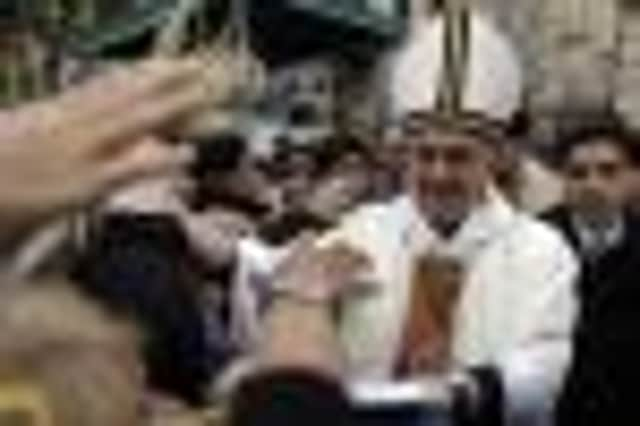Pope Francis haunted by Argentina’s Dirty War


Some 30,000 people were killed during the war and relatives of victims have claimed the new pontiff had a “very cowardly attitude” towards the regime.
The allegations came as it was revealed the former Cardinal Archbishop of Buenos Aires lobbied the Vatican to make the Falkland Islands part of an Argentinian diocese and said of the Argentinian invasion that soldiers “went out to demand what is the motherland’s and what was usurped”.
Advertisement
Hide AdAdvertisement
Hide AdThe Argentine president, Cristina Fernandez de Kirchner, hinted yesterday that she wants Francis to help secure the islands’ return and used a television address to urge him to “carry the message to the great world powers that they participate in dialogue”.
In 1982, Argentina, led by General Leopoldo Galtieri – a leading light in its governing junta since 1976 – invaded the Falklands. The junta’s ambitious leaders gained power by coup and counter-coup, jailing and murdering political opponents.
Yesterday, Monsignor Michael McParland, whose “parish” extends across the Falklands, said he was delighted by the election of the new Pope and insisted Francis would receive a warm welcome should he ever visit.
“He will be received as the Pope, and will be listened to as the Pope, doesn’t matter where he comes from.”
However, Estela de la Cuadra, whose mother co-founded the Grandmothers of the Plaza de Mayo, the activist group that campaigned during the dictatorship in Argentina for the return of the disappeared, said the new leader of the Catholic Church had a “very cowardly attitude”.
Mario José Bergoglio was accused of turning his back on the de la Cuadra family, which lost five relatives to state terror, including Estela’s sister Elena, who was five months pregnant before she was kidnapped and killed in 1977.
The family appealed to the leader of the Jesuits in Rome, who urged Bergoglio to help them. Bergoglio then assigned a monsignor to talk with police, who said the woman, as a communist, was doomed, but she had given birth in captivity to a girl who was given to a family “too important” for the adoption to be reversed.
Bergoglio testified in 2010 that he did not know about any stolen babies until well after the dictatorship was over. Yesterday Ms de la Cuadra said: “Bergoglio has a very cowardly attitude when it comes to something so terrible as the theft of babies. The question is how to save his name, save himself. But he can’t keep these allegations from reaching the public.”
Advertisement
Hide AdAdvertisement
Hide AdOther activists remain angry over the positions Bergoglio has taken in recent years as Argentina launched investigations into those responsible for the killings, insisting that he is more interested in saving face.
He twice invoked his right under Argentine law to refuse to appear in open court in trials involving torture and murder inside the notorious Navy Mechanics School – used as a jail – and the theft of babies from detainees.
When he eventually did testify in 2010, his answers were evasive, critics said.
Some leading Argentine human rights activists, however, insist that Bergoglio does not deserve to be lumped with church figures who were aligned with the dictatorship.
“Perhaps he didn’t have the courage of other priests, but he never collaborated with the dictatorship,” said Adolfo Perez
Esquivel, who won the 1980 Nobel Peace Prize for documenting the junta’s atrocities.
According to his biographer, Bergoglio took risks to save subversives, including passing his identity papers to a wanted man with a similar appearance which allowed him to escape to Brazil.
Yet the most damning accusation against Bergoglio is that in 1976, as the leader of the country’s Jesuits, he withdrew support for two slum priests – Orlando Yorio and Francisco Jalics – whose activist colleagues in the liberation theology movement were disappearing. The priests were kidnapped and tortured at the Navy Mechanics School.
Advertisement
Hide AdAdvertisement
Hide AdBergoglio had said he told the priests to give up their work for their own safety. They refused.
In order to secure their release, Bergoglio persuaded the family priest of Jorge Videla, then the country’s dictator, to call in sick so that he could say mass instead. Once inside the junta leader’s home, Bergoglio appealed for mercy.
His biographer insists that at time when a number of bishops supported the junta, while others challenged the regime, Bergoglio trod a fine middle line.
Under his leadership, Argentina’s bishops issued an apology in 2012 for the church’s failures to protect its flock during the dictatorship, but the statement blamed the era’s violence on both the junta and its enemies.